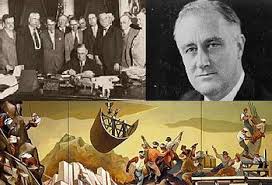
On the economic front there have been a few positive developments as oil and gas prices have begun to dip as big money is fleeing to other investments, but this will likely not last long as our government has yet to address the underlying problem with our economy and dollar, overspending. We continually spend far more then we take in, and as many have said, this cannot continue. In studying the past it is amazing that we continue down this path of using government spending to help stimulate the economy.
During the Great Depression our country under Herbert Hoover attempted to stimulate the economy by lowering personal taxes, but it was too little too late. As John Kenneth Galbraith says in A Journey Through Economic Time the tax break amounted to the following, "A taxpayer with an income of $5,000, a very comfortable return in those days, had his or her tax cut by two-thirds. It went from $16.88 to $5.63. Someone with $10,000, roughly the equivalent of $100,000 today, saw his tax go from $120 down to $65." Obviously this was not nearly drastic enough to stave the economic tsunami that was headed our way. As history shows, Hoover ended up losing the election, and in came F.D.R. and The New Deal.

Roosevelt's cabinet contained a vast array of political insight, including a rather 'vocal' communist bunch, who helped to form the economic policy of the next decade. F.D.R., with advice from some prominent economist, wanted the government to buy gold to drive up the prices, and thus, presumably, the prices of other commodities would go higher as well, but this was an utter failure. This did not stop F.D.R., according to Galbraith, from his toying with, and destruction of, the gold standard as he would candidly as his economic adviser each morning what the price of gold should be. Many other policies were undertaken by the administration, of which Galbraith was a part, and in one quote from his book you can see the administrations lies coming through when he states the following, "He too promised fiscal responsibility, strong steps toward a balanced budget. Later, in 1936, when he asked Samuel Rosemann, his highly accomplished assistant, how he might reconcile the spending and deficits of his first four years with the promise of strict fiscal rectitude that he had made in a speech in Pittsburgh in 1932, he was told, according to legend, that his only course was to deny firmly that he had ever given that speech." Sounds eerily familiar to what our current government does when the actions don't match the promises.
When looking at the excessive government spending program that was undertaken during the Great Depression even Galbraith admits it did nothing, or quite possibly made the situation worse, and that the real reason we made it out of that economic disaster was the advent of World War II. I hope our current government will reverse course in its spending habits, and that in the end we will not have to look for a great war to get us out of this economic hole that we are in.
By Jeffrey Brandon Lee

No comments:
Post a Comment